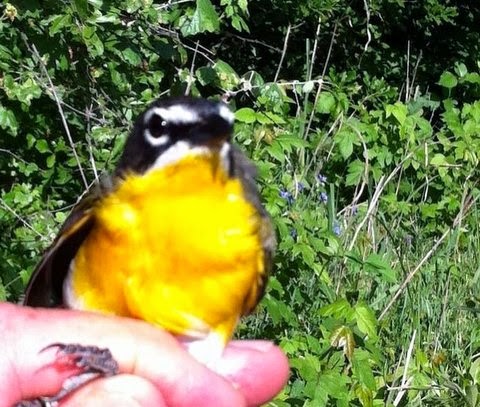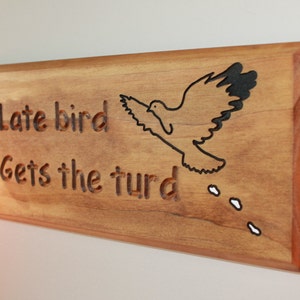
It’s often used as a more tame way to show excitement or dread in front of young ones.Įxample: “My boss was all chuffed about my project looks like a raise is in my future.”Ī term for bad or tough luck. The root chuff is another British catch all whose origin is similar to “puff” and was used to describe the sound of a steam engine. Again, context can imply a different emotion though, as chuffed can also mean annoyed or displeased. Often this word is thrown around in a phrase like “chuffed to bits” or “dead chuffed” to further accentuate the pleasure. We do know that the phrase was popularized around the mid-19th century, and most renowned origination with brass monkeys being containers of some kind for a ship’s cannonballs is false.Įxample: “Winter is coming, because it’s brass monkeys out here.”ĭelighted or very happy pleased. This one has many origin stories, all seeming plausible, none quite verifiable.
#LATE BIRD GETS THE TURD FULL#
The full phrase is “cold enough to freeze the balls/tail off a brass monkey”, which is to say it is extremely cold. In actuality his recorded last words were “God damn you.” in response to being given sedative before his doctor intentionally killed him! “I’m too buggered to go to the pub.” - “I’m too tired to go drink”Ī slang aside: A common misconceptions is that King George V’s last words were “Bugger Bognor” (in response to hearing that after he recovered from his illness, they would visit the family resort of Bognor). “Bugger off, mate we’re having a chat” - “Go away, dude we’re talking” “They’re a bugger for footie, aren’t they?” – “They’re really into soccer, huh?” Below are some examples of different uses of this flexible phrase followed by rough translations to give you an idea of its meaning: Luckily the word has become more of an all purpose tool. The origins of the word are tied to the 13th century Catholic church running a campaign againsts some alleged sexual deviants, using the word as slander. The word can be used affectionately tease someone, but also to berate in a more negative tone. The phrase can be used in a myriad of ways and context is everything. Clever usage makes this quite the Brit-Army knife of the slang world.īritish catch-all with profane connotations, including sodomy. On top of the many interpretations, it can be spelled in many ways (bolloxed, bollixed, etc.) and can even be used to express pride or showmanship by appending the word dog (the dog’s bollocks).



Literally testicles, but most often used to express contempt, frustration, or annoyance. Argle is a modified way to say argue, and over time it became a nonsensical rhyme, which can be quite fun to say aloud.Įxample: “Looks like the blokes across the street are having a little bit of an argy bargy.” The term originates from the nineteenth century as a Scottish phrase. The phrase can be modified as “all to cock” which is the original slang blended with “cocked up”, which also means shambolic.Įxample: “Then everyone left the party and it went all to pot” or “The lift has gone all to cock maybe we can sell it”.Ī heated argument or confrontation. This was applied to summarized situations where something was of poor quality or like refuse, thus going to the pot. Long ago, when families would finish a meal, they would save scrape and throw it in the pot to save for later meals, usually stews.

Below you’ll find terms and their origins with these we hope you don’t even bat an eye when speaking with an English-man/woman, and perhaps even impress them with your Anglophile skills.īungled or ruined messed up. Remember to always show respect and not to do terrible accents (unless you’re quite smashing at it, mate). Ay-up, ladies and gents: it’s time for a British Slang roll-call! Today we’ll be visiting our neighbors across the pond here at to give you a deep dive into the countries most enticing jargon.


 0 kommentar(er)
0 kommentar(er)
